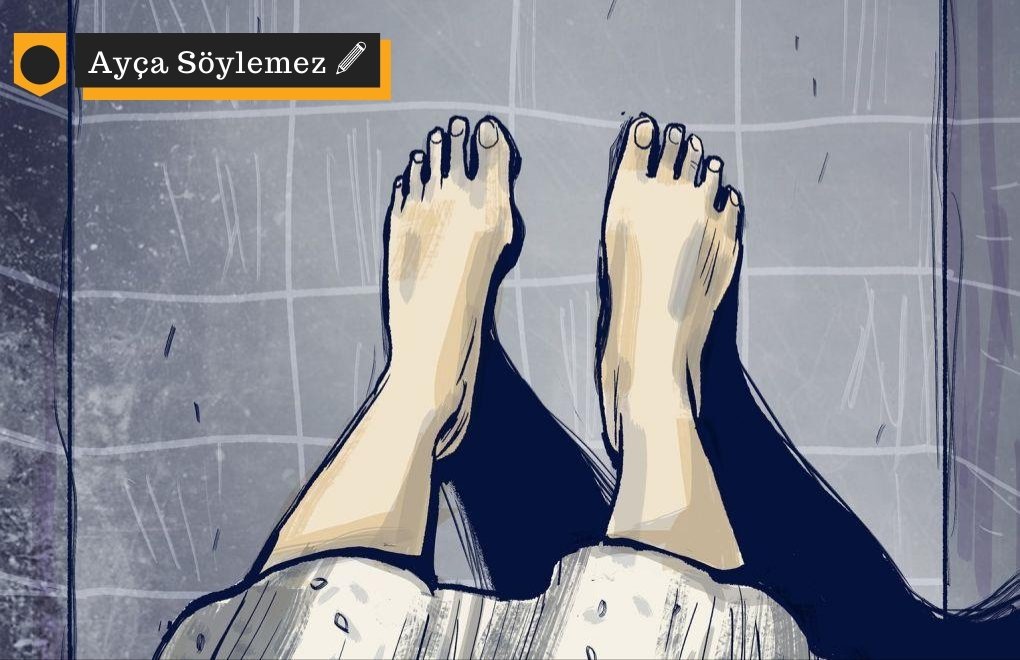Given an aggravated life sentence, Akman is forced to live in a five-step-long cell for 23 hours a day. For one hour, she is locked up in an open place so that she can get some air. Akman is on a death fast for 161 days, demanding an improvement of conditions.
Author: Ayça Söylemez
Drawings: Zeynep Özatalay, Erdoğan Karayel
“She can leave her cell only for an hour a day to get some air, which causes her health condition to deteriorate. She cannot receive enough sunlight or air. She is kept in her cell for 23 hours a day, the cell is so small that one can only take five steps inside there.”
Sentenced to aggravated life imprisonment, Didem Akman has been on a death fast for 161 days. She demands that the conditions of execution be improved in such a way to adapt to humane conditions.
Having spoken to Akman yesterday (July 28), her attorneys have told bianet the following about her condition:
“Didem can be out to get some air only for an hour a day, which causes oedema to form in her feet. Her feet have swollen a lot. The slippers and shoes that she wears have opened wounds in her swollen feet. She wanted some cream. At first, they didn’t give her, then they gave some by putting on a piece of cotton. Just think about how hygienic it could possibly be. The medical team at the sickroom now has to dress her wounds.”
‘She is expected to spend her life in a disciplinary cell’

The attorneys of Akman have submitted a petition to the İzmir Aliağa Women’s Prison, where Akman is serving her aggravated life sentence, and demanded her referral to the Sincan Prison in Ankara, which is arranged according to aggravated life imprisonment conditions.

Because the cell Akman is currently staying is not a one-person ward that has been designed for the ones who will serve an aggravated life sentence. Her cell has been built for disciplinary punishments.
The petition of the attorneys has underlined that as per the Law no. 5275, prisoners shall be held in these cells for 20 days at most for disciplinary reasons, noting that Akman is expected to spend her lifetime there.
“Aliağa Penal Institution does not have cells specifically designed for the execution of aggravated life sentences,” the attorneys have underlined.
Sentenced to aggravated life imprisonment in 2012, Didem Akman was held in Sincan Prison until 2016. She was referred to Aliağa Prison after that. She has been staying there for four years now.
‘She has to wash her dishes in the toilet’
The petition has shared the following details about her prison conditions:
“The door of her cell does not open to the area where prisoners go out to get air. She is accompanied along a corridor and can reach the area only after that. In other words, when she is out to get some air, she is still locked up there. For that reason, she cannot get back to her cell due to weather conditions or to meet her needs such as food, toilet and hygiene. As the door of the area is locked up, she is kept waiting there under the rain for an hour.
“As the area where she lives has been designed as a cell to be used for disciplinary reasons, it does not have a kitchen part. Akman has to wash the kitchen utensils in the place where she relieves herself.
‘She only see the wardens’
“As the cell-type areas are designed for the execution of disciplinary punishments for 20 days at most, the cells in the institution are neglected, humid and has water leaks. Akman cannot use her right to converse like other arrestees and convicts. It means that she has to use her right to get air, which has been reduced to one hour a day, all by herself. She could only see wardens during her all these years in prison.
“In Sincan Prison, where she was previously staying, she had the right to go out to get some air for four hours a day and go to the library/sports/courses once a week. She does not have any of these rights in İzmir.

’15-minute meetings with family, friends not allowed’
“While she has the right of phone call and visitation, she can use it only once in two weeks and with her next-of-kins and guardian. When these people do not come to the visitation, she cannot see anybody else.
“The period of visitation is 45 minutes, which accounts for 90 hours a year. She cannot socialize in a healthy manner and the permanent effects of isolation have been increasing.
“Her restricted number of visitors and visitations are subjected to a special procedure. She is made to meet her visitors one by one, she cannot see all of them at once. For instance, in a 45-minute visitation, she can see one of her three relatives for 15 minutes each.
“In fact, there are judgements of the Court of Cassation, indicating that the visitations can be held together. However, the Judgeship of Execution of the prison where she is held claims that the Court of Cassation handed down such a judgement as it had misunderstood the law and did not allow a visitation to be held by all family members at the same time.”




